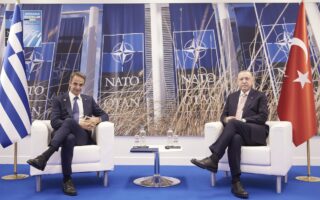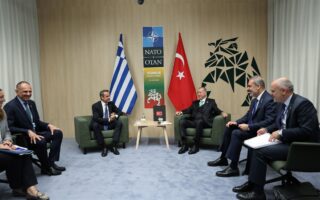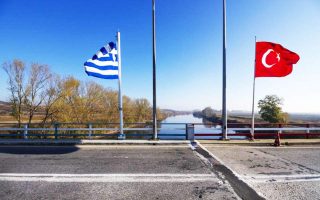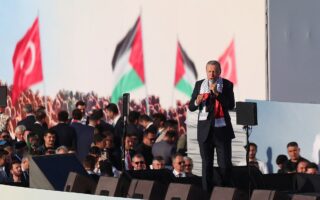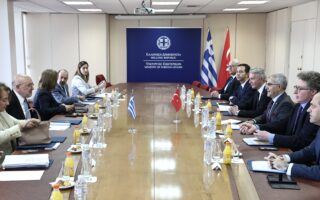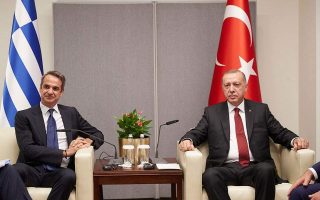Ankara’s distancing and the challenge for Athens
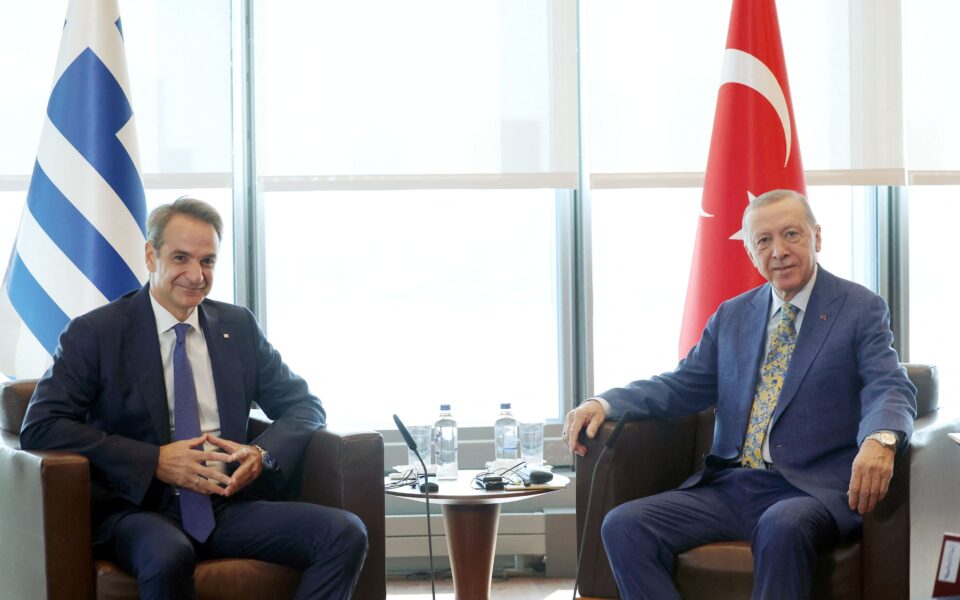
In less than 20 days, Greek Prime Minister Kyriakos Mitsotakis and Turkish President Recep Tayyip Erdogan will meet for the third time in five months. It is obvious that a positive, almost unprecedented momentum has built up in the relationship between the two men, which is also reflected in bilateral contacts. It is not so much the frequency of meetings as the avoidance of statements and actions that ignite tension. It seems that, informally, but very essentially, it has been agreed that disagreements, either bilaterally or on issues of regional or global interest, should not negatively affect the climate and should not cause public recriminations.
In the past few years, Turkey reacted even to insignificant issues with provocative actions – from reserving areas for military drills to overflights over Greek islands. There were also the seismic surveys or the demarcation of an exclusive economic zone with Libya, thus responding to Greek initiatives that Ankara believed were marginalizing it (e.g. regional deals in the Eastern Mediterranean). Overflights and other violations, once regular, would now make main headlines, and since last April they have been very limited or zero. At the same time, the irritable Erdogan, who doesn’t let anything slip and responds fiercely to what he thinks concerns him, has not made the slightest comment about the Greek premier’s statements that he and Turkey are on the wrong side of history on the Gaza issue.
Furthermore, despite his unwavering stance in favor of two states in Cyprus, for the time being, Turkey has not proceeded with a seismic survey or sent a floating drilling rig inside Cyprus’ continental shelf, showing restraint, despite having spent more than a billion dollars on purchasing the relevant equipment.
It is undoubtedly in Greece’s interest to maintain and enrich this momentum with actions that will partially restore confidence, by consolidating de-escalation, removing the possibility of a crisis, and making it difficult to return to the crescendo of tensions of the past few years. That is because the side that provokes them anew will have to explain the reasons and it will be difficult to convince allies and especially the West. After all, the two wars in Ukraine and the Middle East do not allow the opening of a new front, especially between two NATO partners.
Greece, however, is also favored by Turkey’s ambiguous and even alienating behavior in relation to the West, not because some wishful thinkers believe that this weakens Ankara, but because with an agenda of divergent interests with obvious intentions for autonomy – as Turkey still depends on the West on economic and security issues – its current stance limits its room for maneuver in relation to Greece.
That is, once Ankara decided, for negotiating as well as substantive reasons (distancing and conscious avoidance of alignment with the West), to open one front before closing another, or at least to maintain pending issues with the West which do not affect Greek-Turkish relations, it is not in the position to have demands (also) from Greece. Both because it has too many fronts open and because of the general concern about its intentions is even greater. Because of the aforementioned, Greece has established itself as an unwavering ally of the Americans and of the West in general in the region.
The American presence in Greece is stronger than ever (fortunately not only militarily but also in terms of economy and energy), so, given time, the US will not have a reason to sideline us for the sake of Ankara, considering they trust us more and have invested in Greece. In the West – even in Germany, which traditionally has functional relations with Turkey – they are worried about Turkey’s continuous institutional divergence, its clumsy and blackmailing behavior – such as with Sweden’s accession to NATO and migration – and its consistent (and not ad hoc as in the past) distancing from basic choices of the West. They realize that they cannot rely on Turkey. The latter’s effort at diplomatic autonomy, therefore, has consequences, because the more permanent characteristics it acquires, the greater the need to find reliable and durable alternatives. Of course, all this does not imply the isolation of Turkey, which will continue to be very important for the West, despite its vacillations.
In any case, Greek diplomacy is called upon to answer to what extent it favors diplomatic identification with the US in a transitional international environment heading toward polycentrism and what benefits it derives, as well as whether it is content to de-escalate tensions with Turkey (which may prove fragile) or if it will attempt to commit it to a course of normalization but also a serious search for an essential and definitive solution.
Constantinos Filis is the director of the Institute of Global Affairs and an associate professor at the American College of Greece.
